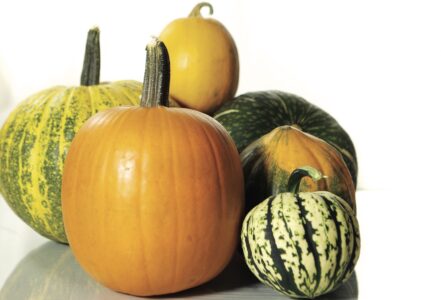
by AdobeStock/la_vanda
Yields 2-1/2 quarts SERVINGS
Ingredients
- 8 pounds mixed persimmons
Kitchen Items
- crockpot
- muslin cloth
Directions
- Dump persimmons of any variety into a crockpot.
- Cover with muslin cloth and tie around the perimeter to discourage fruit flies.
- Set the crock in a sunny spot and let nature take its course.
- In the first several weeks, it will be necessary to stir the mixture every 2 days to keep it from putrefying. By the end of the first week, you will have a pleasantly effervescent, fruity slush.
- Keep stirring and tasting over the next few weeks.
- As the winter sun softens, you will not need to stir the mash as often.
- Once you can taste that the persimmons are starting to throw off vinegary overtones, it is time to let the mash rest so that it can form a “mother” and mellow slowly over the course of the cool months leading up to spring.
- Keep tasting periodically, but do not disturb the gelatinous particles forming on the surface, as this is the mother.
- Strain the vinegar when the taste has rounded out and has a clear fruit profile (about 3 months) but certainly before the weather turns warm.
- Set a fine-mesh strainer lined with a square of muslin cloth over a medium-sized bowl and scoop about 4 cups (1000 cc) of the mash into the strainer.
- Let the liquid drip out naturally. This will take several hours, so prepare to do this extracting operation over the course of a couple of days. Persevere, though; you will be happy you did.
- After dripping for a couple of hours, fold the muslin cloth over the top of the mash and set a small cast iron enameled pot on top to encourage the juices to press out.
- Add a few cans inside the pot for extra weight.
- Finally, remove the weights, twist the cloth ends to form a bundle, and squeeze with all your might.
- While it is possible that a full gelatinous disk (mother) will form on the surface of the persimmon mash, do not be alarmed if you only end up with small gelatinous patches here and there. It merely means you may have been a bit overzealous in your stirring. If your vinegar tastes like vinegar, it is vinegar. If the mash smells off or tastes of soap, it has gone bad. Toss it and try again the following year!
Use your persimmon harvest and test your patience over winter with this Persimmon Vinegar recipe.


More recipes from Preserving the Japanese Way:
Reprinted with permission from Preserving the Japanese Way: Traditions of Salting, Fermenting, and Pickling for the Modern Kitchen, by Nancy Singleton Hachisu and published by Andrews McMeel Publishing, LLC, 2015.






